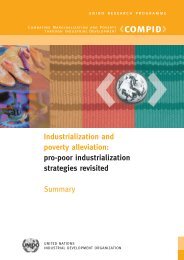Manual on the Development of Cleaner Production Policies ... - Unido
Manual on the Development of Cleaner Production Policies ... - Unido
Manual on the Development of Cleaner Production Policies ... - Unido
You also want an ePaper? Increase the reach of your titles
YUMPU automatically turns print PDFs into web optimized ePapers that Google loves.
DEVELOPMENT OF CP POLICY<br />
MODULE 1: INTRODUCING CP<br />
Finally, in some companies CP projects are initiated to improve <strong>the</strong> level <strong>of</strong> compliance with<br />
envir<strong>on</strong>mental regulati<strong>on</strong>s, ei<strong>the</strong>r as a result <strong>of</strong> direct regulatory pressure from <strong>the</strong> authorities, or in <strong>the</strong><br />
search for a more cost-effective way to meet legal requirements than that <strong>of</strong>fered by end-<strong>of</strong>-pipe<br />
measures.<br />
SLIDE: O<strong>the</strong>r related c<strong>on</strong>cepts<br />
• Eco-efficiency<br />
• Waste minimizati<strong>on</strong><br />
• Polluti<strong>on</strong> preventi<strong>on</strong><br />
• Green productivity<br />
<strong>Cleaner</strong> Producti<strong>on</strong> = polluti<strong>on</strong> preventi<strong>on</strong> = waste minimizati<strong>on</strong> =<br />
ecoefficiency<br />
For businesses, <strong>the</strong>se c<strong>on</strong>cepts mean practically <strong>the</strong> same thing.<br />
SLIDE: O<strong>the</strong>r related c<strong>on</strong>cepts/2<br />
What all those c<strong>on</strong>cepts have in comm<strong>on</strong> is an attempt to maintain <strong>the</strong> same<br />
level <strong>of</strong> output using less inputs (e.g. water, energy, raw materials), <strong>the</strong>reby<br />
improving efficiency and reducing polluti<strong>on</strong>.<br />
The underlying principles are innovati<strong>on</strong> and preventi<strong>on</strong> <strong>of</strong> polluti<strong>on</strong> in <strong>the</strong><br />
first place, ra<strong>the</strong>r than c<strong>on</strong>trolling <strong>the</strong> emissi<strong>on</strong>s with end-<strong>of</strong>-pipe measures<br />
<strong>on</strong>ce <strong>the</strong> “necessary” c<strong>on</strong>taminati<strong>on</strong> has been generated.<br />
The idea is to present <strong>the</strong> most comm<strong>on</strong> terms related to <strong>Cleaner</strong> Producti<strong>on</strong> and<br />
preventive envir<strong>on</strong>mental management. It should be clarified that <strong>the</strong> term<br />
“<strong>Cleaner</strong> Producti<strong>on</strong>” is used in its broadest sense, that includes various o<strong>the</strong>r<br />
related c<strong>on</strong>cepts. While <strong>the</strong>y do differ slightly, it is worth stressing for practical<br />
purposes, especially when dealing with <strong>the</strong> industrial entrepreneur, that <strong>the</strong><br />
c<strong>on</strong>cepts mean practically <strong>the</strong> same.<br />
Background<br />
The terms eco-efficiency, polluti<strong>on</strong> preventi<strong>on</strong>, source reducti<strong>on</strong> and waste minimizati<strong>on</strong>, and green<br />
productivity are <strong>of</strong>ten used syn<strong>on</strong>ymously with <strong>Cleaner</strong> Producti<strong>on</strong>. <strong>Cleaner</strong> producti<strong>on</strong> is a strategy<br />
for <strong>the</strong> c<strong>on</strong>tinuous improvement <strong>of</strong> products, services and processes in order to reduce polluti<strong>on</strong> and<br />
waste at source, which can also result in financial benefits.<br />
Eco-efficiency: The term “eco-efficiency” was coined by <strong>the</strong> World Business Council for Sustainable<br />
<strong>Development</strong> in 1992, and is defined as <strong>the</strong> delivery <strong>of</strong> competitively priced goods and services that<br />
satisfy human needs and bring quality <strong>of</strong> life, while progressively reducing ecological impacts and<br />
resource intensity throughout <strong>the</strong> life cycle, to a level at least in line with <strong>the</strong> Earth’s estimated<br />
carrying capacity.<br />
Eco-efficiency is a combinati<strong>on</strong> <strong>of</strong> ec<strong>on</strong>omic and ecological efficiency, and is basically about doing<br />
more with less. Eco-efficiency means producing more goods and services with less energy and fewer<br />
natural resources. Eco-efficient businesses get greater value out <strong>of</strong> <strong>the</strong>ir raw materials as well as<br />
producing less waste and less polluti<strong>on</strong>.<br />
PAGE 19
















